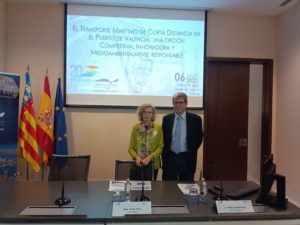
The president of the Port Authority of Valencia (PAV) has pointed out that “we must invest in new terminals, digitalisation and decarbonisation to boost this type of traffic”.
The PAV is developing infrastructures to promote short sea shipping, such as the new passenger terminal at the Port of Valencia and the intermodal terminal at the Port of Sagunto.
Experts from the maritime-port sector have analysed the logistical and environmental benefits of short sea shipping at a conference held in the Clock Building.
The president of the Port Authority of Valencia (PAV), Aurelio Martínez, has stressed the importance of supporting “short sea shipping traffic to promote energy transition, the decarbonisation of roads and the fight against climate change. It is vital for the future of maritime transport to encourage this traffic, which implies a great effort from the public administration, but especially from private companies”.
During his speech, the president of the PAV made an analysis of the supply and demand of this type of transport that “has experienced from 2014 to 2021 a significant increase in the European Union, which has also set a growth of 25% by 2030 within the framework of the Sustainable Mobility Strategy. Short sea shipping accounts for 58% of European sea traffic, highlighting the growth in areas such as the Eastern Mediterranean, while in the Western area it has been more moderate”.
In this sense, Aurelio Martínez has indicated that “we must bet on this type of maritime traffic and for this we must invest in new terminals and infrastructures for short sea shipping, new technologies and digitalisation, and decarbonisation projects. These are actions that the European Union has budgeted at more than 3,000 million euros”.
With regard to Valenciaport, it should be remembered that new infrastructures are being built, such as the new passenger terminal, which is designed to handle cruise traffic, regular lines with the Balearic Islands and Algeria, as well as ro-ro traffic (platforms or vehicles that access the ships with their own means), and the multi-purpose terminal at Muelle Centro 2 in the Port of Sagunto, which will strengthen the operation of ro-ro ships.
Valenciaport currently has 11 international services through the motorways of the sea, which link the Valencian precinct with 20 countries and 66 ports. It also has 10 ro-pax connections with the Balearic Islands. During 2021, ro-ro traffic exceeded 12.86 million tonnes, 14.61% more than in 2020. The transport of automobiles under the goods regime in 2021 amounted to 493,697 units, which represents a decrease of 7.4%.
The head of the PAV inaugurated the conference ‘Short Sea Shipping in the Port of Valencia: A competitive, innovative and environmentally responsible option’ in which experts from the maritime-port sector analysed the logistical and environmental benefits of short sea shipping. The event was organised by the Spanish Association for the Promotion of Short Sea Shipping SPC Spain in collaboration with the PAV.
The president of SPC Spain, Pilar Tejo, highlighted the importance of this conference, which brings together administrations and port and logistics companies to promote a type of traffic that has grown in Spain in both the Atlantic and Mediterranean areas.
Cristian García, head of Sustainable Transport and Digitalisation at the Ministry of Transport, MITMA, explained the support programme for the sector, which includes 60 million euros in eco-incentives for the promotion of maritime freight transport that encourages environmental improvement and the transfer from road to sea with sustainability criteria.
During the conference, Manuel García, head of Business Intelligence at the PAV, detailed the characteristics of road traffic and the motorways of the sea from the point of view of Valenciaport. Agustín Fernández, director of United European Car Car Carriers (UECC), discussed the challenge of the electric vehicle in maritime transport, while Ferdinand Krijnsen, representative of Toyota Valencia, explained the company’s commitment to meeting its goal of becoming emission-neutral by 2040.
On the other hand, a real case of short-distance rail transport has been shown, which will be explained by Alfonso Rodríguez, general manager of Pecovasa. The day ended with a round table, moderated by Pilar Tejo, where the challenge of decarbonisation on the Motorways of the Sea was discussed by Mario Massarotti, CEO of Grimaldi Logística España; José Manuel Orengo, Director of Expansion of Baleària; Miguel Pardo, Commercial Director of Transmed GLE; and Daniel Mozo, Director of Cargo of GNV.

